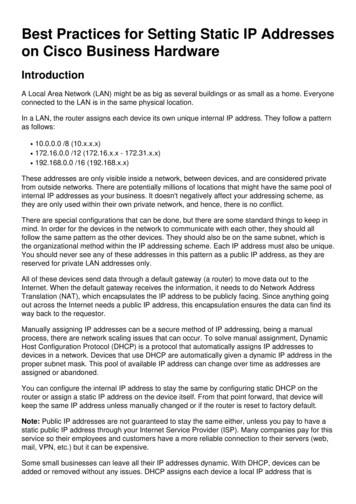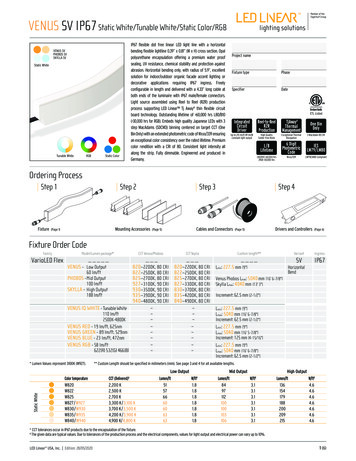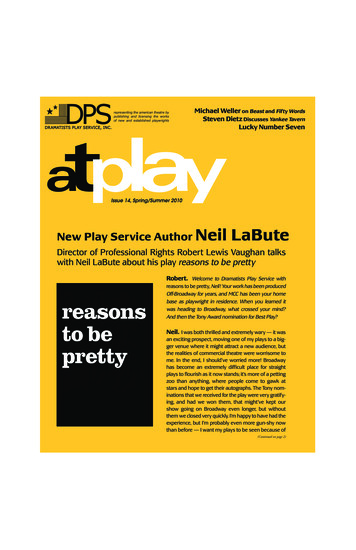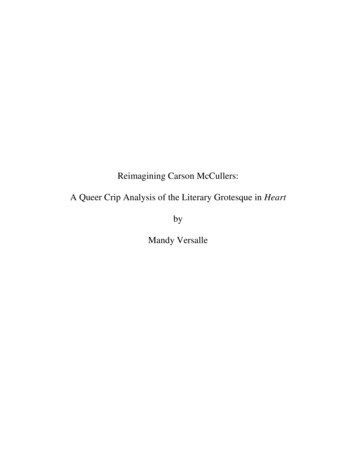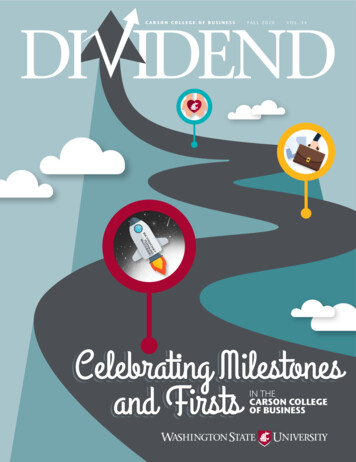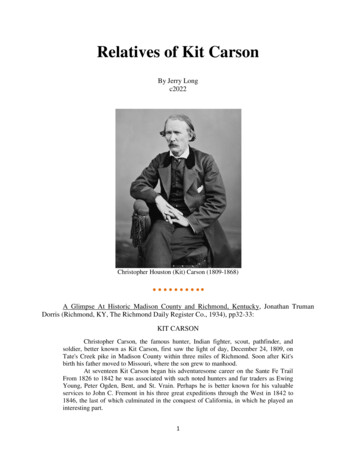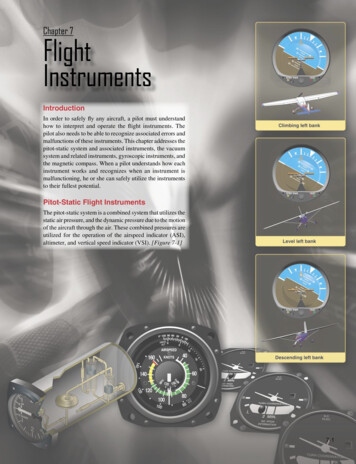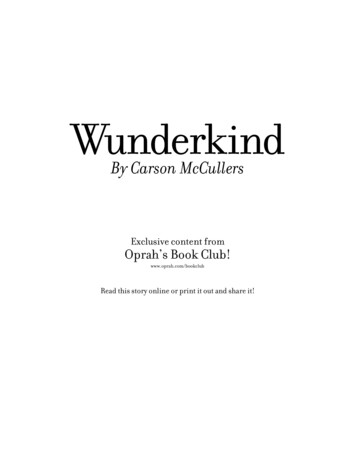
Transcription
By Carson McCullersExclusive content fromOprah’s Book Club!www.oprah.com/bookclubRead this story online or print it out and share it!
She came into the living room, her music satchel plopping against her winter-stockinged legs andher other arm weighted down with schoolbooks, and stood for a moment listening to the soundsfrom the studio. A soft procession of piano chords and the tuning of a violin. Then Mister Bilderbachcalled out to her in his chunky, guttural tones:“That you, Bienchen?”As she jerked off her mittens she saw that her fingers were twitching to the motions of the fugue shehad been practicing that morning. “Yes,” she answered. “It’s me.”“I,” the voice corrected. “Just a moment.”She could hear Mister Lafkowitz talking—his words spun out in a silky, unintelligible hum. A voicealmost like a woman’s, she thought, compared to Mister Bilderbach’s. Restlessness scattered herattention. She fumbled with her geometry book and Le Voyage de Monsieur Perrichon before puttingthem on the table. She sat down on the sofa and began to take her music from the satchel. Again, shesaw her hands, the quivering tendons that stretched down from her knuckles, the sort fingertipcupped with curled, dingy tape. The sight sharpened the fear that had begun to torment her for thepast few months.Noiselessly she mumbled a few phrases of encouragement to herself. A good lesson—a goodlesson—like it used to be—Her lips closed as she heard the stolid sound of Mister Bilderbach’sfootsteps across the floor of the studio and the creaking of the door as it slid open.For a moment she had the peculiar feeling that during most of the fifteen years of her life she hadbeen looking at the face and shoulders that jutted from behind the door, in a silence disturbed onlyby the muted, blank plucking of a violin string. Mister Bilderbach. Her teacher, Mr. Bilderbach. Thequick eyes behind the horn-rimmed glasses; the light thin hair and the narrow face beneath; the lipsfull and loose shut and the lower one pink and shining from the bites of his teeth; the forked veins inhis temples throbbing plainly enough to be observed across the room.“Aren’t you a little early?” he asked, glancing at the clock on the mantelpiece that had pointedto five minutes of twelve for a month. “Josef’s in here. We’re running over a little sonatina bysomeone he knows.”“Good,” she said, trying to smile. “I’ll listen.” She could see her fingers sinking powerless intoa blur of piano keys. She felt tired—felt that if he looked at her much longer her hands mighttremble.He stood uncertain, halfway in the room. Sharply his teeth pushed down on his bright, swollenlip. “Hungry, Bienchen?” he asked. “There’s some apple cake Anna made, and milk.”“I’ll wait till afterward,” she said. “Thanks.”“After you finish with a very fine lesson—eh?” His smile seemed to crumble at the corners.There was a sound from behind him in the studio and Mister Lafkowitz pushed at the otherPage 1 of 10Carson McCullersWunderkindRead online with Oprah’s Book Club!www.oprah.com/bookclub
panel of the door and stood beside him.“Frances?” he said, smiling. “And how is the work coming now?”Without meaning to, Mister Lafkowitz always made her feel clumsy and overgrown. He wassuch a small man himself, with a weary look when he was not holding his violin. His eyebrows curvedhigh above his sallow, Jewish face as though asking a question, but the lids of his eyes drowsedlanguorous and indifferent. Today he seemed distracted. She watched him come into the room for noapparent purpose, holding his pearl-tipped bow in his still fingers, slowly gliding the whitehorsehair through a chalky piece of rosin. His eyes were sharp bright slits today and the linenhandkerchief that flowed down from his collar darkened the shadows beneath them.“I gather you’re doing a lot now,” smiled Mister Lafkowitz, although she had not yet answeredthe question.She looked at Mister Bilderbach. He turned away. His heavy shoulders pushed the door openwide so that the late afternoon sun came through the window of the studio and shafted yellow overthe dusty living room. Behind her teacher she could see the squat long piano, the window, and thebust of Brahms.“No,” she said to Mister Lafkowitz, “I’m doing terribly.” Her thin fingers flipped at the pagesof her music. “I don’t know what’s the matter,” she said, looking at Mister Bilderbach’s stoopedmuscular back that stood tense and listening.Mister Lafkowitz smiled. “There are times, I suppose, when one–”A harsh chord sounded from the piano. “Don’t you think we’d better get on with this?” askedMister Bilderbach.“Immediately,” said Mister Lafkowitz, giving the bow one more scrape before starting towardsthe door. She could see him pick up his violin from the top of the piano. He caught her eye andlowered the instrument. “You’ve seen the picture of Heime?”Her fingers curled tight over the sharp corner of the satchel. “What picture?”“One of Heime in the Musical Courier there on the table. Inside the top cover.”The sonatina began. Discordant yet somehow simple. Empty but with a sharp-cut style of itsown. She reached for the magazine and opened it.There Heime was—in the left-hand corner. Holding his violin with his fingers hooked downover the strings for a pizzicato. With his dark serge knickers strapped neatly beneath his knees, asweater and rolled collar. It was a bad picture. Although it was snapped in profile his eyes were cutaround toward the photographer and his finger looked as though it would pluck the wrong string. Heseemed suffering to turn around toward the picture-taking apparatus. He was thinner—his stomachdid not poke out now—but he hadn’t changed much in six months.Heime Israelsky, talented young violinist, snapped while at work in his teacher’s studio onPage 2 of 10Carson McCullersWunderkindRead online with Oprah’s Book Club!www.oprah.com/bookclub
Riverside Drive. Young Master Israelsky, who will soon celebrate his fifteenth birthday, has beeninvited to play the Beethoven Concerto with–That morning, after she had practiced from six until eight, her dad had made her sit down atthe table with the family for breakfast. She hated breakfast; it gave her a sick feeling afterwards. Shewould rather wait and get four chocolate bars with her twenty cents lunch money and much themduring school—bringing up little morsel from her picket under cover of her handkerchief, stoppingdead with the silver paper rattled. But this morning her dad had put a fried egg on her plate and shehad known that if it burst—so that the slimy yellow oozed over the white—she would cry. And that hadhappened. The same feeling was upon her now. Gingerly she laid the magazine back on the table andclosed her eyes.The music in the studio seemed to be urging violently and clumsily for something that was notto be had. After a moment her thoughts drew her back from Heime and the concerto and thepicture—and hovered around the lesson once more. She slid over on the sofa until she could seeplainly into the studio—the two of them playing, peering at the notations on the piano, lustfullydrawing out all that was there.She could never forget the memory of Mister Bilderbach’s face as he had stared at her amoment ago. Her hands, still twitching unconsciously to the motions of the fugue, closed over herbony knees. Tired, she was. And with a circling, sinking away feeling like the one that often came toher just before she dropped off to sleep on the nights when she had over-practiced. Like those wearyhalf-dreams that buzzed and carried her out into their own whirling space.A Wunderkind—a Wunderkind—a Wunderkind. The syllables would come out rolling in the deepGerman way, roar against her ears and then fall to a murmur. Along with the faces circling, swellingout in distortion, diminishing to pale blobs—Mister Bilderbach, Mrs. Bilderbach, Heime, MisterLafkowitz. Around and around in a circle revolving to the guttural Wunderkind. Mister Bilderbachlooming large in the middle of the circle, his face urging—with the others around him.Phrases of music seesawing crazily. Notes she had been practicing falling over each other like ahandful of marbles dropped downstairs. Bach, Debussy, Prokofieff, Brahms—timed grotesquely tothe far off throb of her tired body and the buzzing circle.Sometimes—when she had not worked more than three hours or had stayed out form highschool—the dreams were not so confused. The music soared clearly in her mind and quick, preciselittle memories would come back—clear as the sissy “Age of Innocence” picture Heime had given herafter their joint concert was over.A Wunderkind—a Wunderkind. That was what Mister Bilderbach had called her when, at twelve,she first came to him. Older pupils had repeated the word.Not that he had ever said the word to her. “Bienchen—” (She had a plain American name butPage 3 of 10Carson McCullersWunderkindRead online with Oprah’s Book Club!www.oprah.com/bookclub
she never used it except when her mistakes were enormous.) “Bienchen,” he would say, “I know itmust be terrible. Carrying around all the time a head that thick. Poor Bienchen—”Mister Bilderbach’s father had been a Dutch violinist. His mother was from Prague. He hadbeen born in this country and had spent his youth in Germany. So many times she wished she hadnot been born and brought up in just Cincinnati. How do you say cheese in German? MisterBilderbach, what is Dutch for I don’t understand you?The first day she came to the studio. After she played the whole Second Hungarian Rhapsodyfrom memory. The room graying with twilight. His face as he leaned over the piano.“Now we begin all over,” he said that first day. “It—playing music—is more than cleverness. If atwelve-year-old girl’s fingers cover so many keys in a second—that means nothing.”He tapped his broad chest and his forehead with his stubby hand. “Here and here. You are oldenough to understand that.” He lighted a cigarette and gently blew the first exhalation above herhead. “And work—work—work—. We will start now with these Bach Inventions and these littleSchumann pieces.” His hands moved again—this time to jerk the cord of the lamp behind her andpoint to the music. “I will show you how I wish this practiced. Listen carefully now.”She had been at the piano for almost three hours and was very tired. His deep voice sounded asthough it had been straying inside him for a long time. She wanted to reach out and touch hismuscle-flexed finger that pointed out the phrases, wanted to feel the gleaming gold band ring andthe strong hairy back of his hand.She had lessons Tuesday after school and on Saturday afternoons. Often she stayed, when theSaturday lesson was finished, for dinner, and then spent the night and took the streetcar home thenext morning. Mrs. Bilderbach liked her in her calm, almost dumb way. She was much differentfrom her husband. She was quiet and fat and slow. When she wasn’t in the kitchen, cooking the richdishes that both of them loved, she seemed to spend all her time in their bed upstairs, readingmagazines or just looking with a half-smile at nothing. When they had married in Germany she hadbeen a lieder singer. She didn’t sing any more (she said it was her throat). When he would call her infrom the kitchen to listen to a pupil she would always smile and say that it was gut, very gut.When Frances was thirteen it came to her one day that the Bilderbachs had no children. Itseemed strange. Once she had been back in the kitchen was Mrs. Bilderbach when he had comestriding in from the studio, tense with anger at some pupil who had annoyed him. His wife stoodstirring the thick soup until his hand groped out and rested on her shoulder. The she turned—stoodplacid—while he folded his arms around her and buried his sharp face in the white, nerveless flesh ofher neck. They stood that way without moving. And then his face jerked back suddenly, the angerdiminished to a quiet inexpressiveness, and he had returned to the studio.After she had started with Mister Bilderbach and didn’t have time to see anything of the peoplePage 4 of 10Carson McCullersWunderkindRead online with Oprah’s Book Club!www.oprah.com/bookclub
at high school, Heime had been the only friend of her own age. He was Mister Lafkowitz’s pupil andwould come with him to Mister Bilderbach’s on evenings when she would be there. They would listento their teachers’ playing. And often they themselves went over chamber music together—Mozartsonatas or Bloch.A Wunderkind—a Wunderkind.Heime was a Wunderkind. He and she, then.Heime had been playing the violin since he was four. He didn’t have to go to school; MisterLafkowitz’s brother, who was crippled, used to teach him geometry and European history andFrench verbs in the afternoon. When he was thirteen he had as fine a technique as any violinistin Cincinnati—everyone said so. But playing the violin must be easier than the piano. She knew itmust be.Heime always seemed to smell of corduroy pants and the food he had eaten and rosin. Half thetime, too his hands were dirty around the knuckles and the cuffs of his shirts peeped out dingilyfrom the sleeves of his sweater. She always watched his hands when he played—thin only at the jointswith the hard little blobs of flesh bulging over the short-cut nails and the babyish-looking creasethat showed so plainly in his bowing wrist.In the dreams, as when she was awake, she could remember the concert only in a blur. She hadnot known it was unsuccessful for her until months after. True, the papers had praised Heime morethan her. But he was much shorter than she. When they stood together on the stage he came only toher shoulders. And that made a difference with people, she knew. Also, there was the matter of thesonata they had played together. The Bloch.“No, no—I don’t think that would be appropriate,” Mister Bilderbach had said when the Blochwas suggested to end the programme. “Now that John Powell thing—the Sonate Virginianesque.”She hadn’t understood then; she wanted it to be the Bloch as much as Mister Lafkowitz andHeime.Mister Bilderbach had given in. Later, after the reviews had said she lacked the temperamentfor that type of music, after they called her playing thin and lacking in feeling, she felt cheated.“That oie oie stuff,” said Mister Bilderbach, crackling the newspapers at her. “Not for you,Bienchen. Leave all that to the Heimes and vitses and skys.”A Wunderkind. No matter what the papers said, that was what he had called her.Why was it Heime had done so much better at the concert than she? At school sometimes,when she was supposed to be watching someone do a geometry problem on the blackboard, thequestion would twist knife-like inside her. She would worry about it in bed, and even sometimeswhen she was supposed to be concentrating at the piano. It wasn’t just the Bloch and her not beingJewish—not entirely. It wasn’t that Heime didn’t have to go to school and had begun his training soPage 5 of 10Carson McCullersWunderkindRead online with Oprah’s Book Club!www.oprah.com/bookclub
early either. It was—?”Only she thought she knew.“Play the Fantasia and Fugue,” Mister Bilderbach had demanded one evening a year ago—afterhe and Mister Lafkowitz had finished reading some music together.The Bach, as she played, seemed to her well done. From the tail of her eye she could see thecalm, pleased expression on Mister Bilderbach’s face, see his hands raise climactically from thechair arms and then sink down loose and satisfied when the high points of the phrases had beenpassed successfully. She stood up from the piano when it was over, swallowing to loosen the bandsthat the music seemed to have drawn around her throat and chest. But –“Frances—” Mister Lafkowitz had said then, suddenly, looking at her with his thin mouthcurved and his eyes almost covered by their delicate lids. “Do you know how many children Bachhad?”She turned to him, puzzled. “A good many. Twenty some odd.”“Well then—” The corners of his smile etched themselves gently in his pale face. “He could nothave been so cold—then.”Mister Bilderbach was not pleased; his guttural effulgence of German words had Kind in itsomewhere. Mister Lafkowitz raised his eyebrows. She had caught the point easily enough, but shefelt no deception in keeping her face blank and immature because that was the way MisterBilderbach wanted her to look.Yet such things had nothing to do with it. Nothing very much, at least, for she would grow older.Mister Bilderbach understood that, and even Mister Lafkowitz had not meant just what he said.In the dreams Mister Bilderbach’s face loomed out and contracted I the center of a whirlingcircle. The lip surged softly, the veins in his temples insisting.But sometimes, before she slept, there were such clear memories; as when she pulled a hole inthe heel of her stocking down, so that her shoe would hide it. “Bienchen, Bienchen!” And bringingMrs. Bilderbach’s work basket in and showing her how it should be darned and not gathered togetherin a lumpy heap.And the time she graduated from Junior High.“What you wear?” asked Mrs. Bilderbach the Sunday morning at breakfast when she told themabout how they had practiced to march into the auditorium.“An evening dress my cousin had last year.”“Ah—Bienchen!” he said, circling his warm coffee cup with his heavy hands, looking up at herwith wrinkles around his laughing eyes. “I bet I know what Bienchen wants—”He insisted. He would not believe her when she explained that she honestly didn’t care at all.“Like this, Anna,” he said, pushing his napkin across the table and mincing to the other side of thePage 6 of 10Carson McCullersWunderkindRead online with Oprah’s Book Club!www.oprah.com/bookclub
room, swishing his hips, rolling up his eyes behind his horn-rimmed glasses.The next Saturday afternoon, after he lessons, he took her to the department stores downtown.His thick fingers smoothed over the filmy nets and crackling taffetas that the saleswomen unwoundfrom their bolts. He held her face, cocking his head to one side, and selected pink. Shoes, heremembered too. He liked best some white kid pumps. They seemed a little like old ladies’ shoes toher and the Red Cross label in the instep had a charity look. But it really didn’t matter at all. WhenMrs. Bilderbach began to cut out the dress and fit it to her with pins, he interrupted his lessons tostand by and suggest ruffles around the hips and neck and a fancy rosette on the shoulder. The musicwas coming along nicely then. Dresses and commencement and such made no difference.Nothing mattered much except playing music as it must be played, bringing out the thing thatmust be in her, practicing, practicing, playing so that Mister Bilderbach’s face lost some of its urginglook. Putting the thing into her music that Myra Hess had, and Yehudi Menuhin—even Heime!What had begun to happen to her four months ago? The notes began springing out with a glib,dead intonation. Adolescence, she thought. Some kids played with promise—and worked and workeduntil, like her, the least little thing would start them crying, and worn out with trying to get the thingacross—the longing thing they felt—something queer began to happen—But not she! She was likeHeime. She had to be. She—Once it was there for sure. And you didn’t lose things like that. A Wunderkind aWunderkind Of her he said it, rolling the words in the sure, deep German way. And in the dreamseven deeper, more certain than ever. With his face looming out at her, and the longing phrases ofmusic mixed in with the zooming, circling round, round, round—A Wunderkind. A Wunderkind This afternoon Mister Bilderbach did not show Mister Lafkowitz to the front door, as he usuallydid. He stayed at the piano, softly pressing a solitary note. Listening, Frances watched the violinistwind his scarf about his pale throat.“A good picture of Heime,” she said, picking up her music. “I got a letter from him a couple ofmonths ago—telling about hearing Schnabel and Huberman and about Carnegie Hall and things toeat at the Russian Tea Room.”To put off going into the studio a moment longer she waited until Mister Lafkowitz was ready toleave and then stood behind him as he opened the door. The frosty cold outside cut into the room. Itwas growing late and the air was seeped with the pale yellow of winter twilight. When the door swungto on its hinges, the house seemed darker and more silent than ever before she had known it to be.As she went into the studio Mister Bilderbach got up from the piano and silently watched hersettle herself at the keyboard.“Well, Bienchen,” he said, “this afternoon we are going to begin all over. Start from scratch.Forget the last few months.”Page 7 of 10Carson McCullersWunderkindRead online with Oprah’s Book Club!www.oprah.com/bookclub
He looked as though he were trying to act a part in a movie. His solid body swayed from toe toheel, he rubbed his hands together, and even smiled in a satisfied, movie way. Then suddenly hethrust this manner brusquely aside. His heavy shoulders slouched and he began to run through thestack of music she had brought in. “The Bach—no, not yet,” he murmured. “The Beethoven? Yes. TheVariation Sonata. Opus 26.”The keys of the piano hemmed her in—stiff and white and dead-seeming.“Wait a minute,” he said. He stood in the curve of the piano, elbows propped, and looked ather. “Today I expect something from you. Now this sonata—it’s the first Beethoven sonata you everworked on. Every note is under control—technically—you have nothing to cope with but the music.Only music now. That’s all you think about.”He rustled through the pages of her volume until he found the place. Then he pulled histeaching chair halfway across the room, turned it around and seated himself, straddling the backwith his legs.For some reason, she knew, this position of his usually had a good effect on her performance.But today, she felt that she would notice him from the corner of her eye and be disturbed. His backwas stiffly tilted, his legs looked tense. The heavy volume before him seemed to balance dangerouslyon the chair back. “Now we begin,” he said with a peremptory dart of his eyes in her direction.Her hands rounded over the keys and sank down. The first notes were too loud, the otherphrases followed dry.Arrestingly his hand rose up from the score. “Wait! Think a minute what you’re playing. How isthis beginning marked?”“An-andante.”“All right. Don’t drag it into an adagio then. And play deeply into the keys. Don’t snatch it offshallowly that way. A graceful, deep-toned andante—”She tried again. Her hands seemed separate from the music that was in her.“Listen,” he interrupted. “Which of the variations dominates the whole?”“The dirge,” she answered.“Then prepare for that. This is an andante—but it’s not salon stuff as you just played it. Start outsoftly, piano, and make it swell out just before the arpeggio. Make it warm and dramatic. And downhere—where it’s marked dolce make the counter melody sing out. You know all that. We’ve gone overall this side of it before. Now play it. Feel it as Beethoven wrote it down. Feel that tragedy andrestraint.”She could not stop looking at his hands. They seemed to rest tentatively on the music, ready tofly up as a stop signal as soon as she would begin, the gleaming flash of his ring calling her to halt.“Mister Buderbach—maybe if I—if you let me play through the first variation without stopping I couldPage 8 of 10Carson McCullersWunderkindRead online with Oprah’s Book Club!www.oprah.com/bookclub
do better.”“I won’t interrupt,” he said.Her pale face leaned over too close to the keys. She played through the first part, and obeyeda nod from him, began the second. There were no flaws that jarred on her, but the phrases shaped froher fingers before she had put into them the meaning that she felt.When she had finished he looked up from the music and began to speak with dull bluntness: “Ihardly believe those harmonic fillings in the right hand. And incidentally, this part was supposed totake on intensity, develop into foreshadowings that were supposed to be inherent in the first part. Goon with the next one, though.”She wanted to start it with subdued viciousness and progress to that feeling of deep, swollensorrow. Her mind told her that. But her hands seemed to gum in the keys like limp macaroni and shecould not imagine the music as it should be.When the last note had stopped vibrating, he closed the book and deliberately got up from thechair. He was moving his lower jaw from side to side—and between his open lips she could glimpsethe pink healthy lane to his throat and his strong smoke-yellowed teeth. He laid the Beethovengingerly on top of the rest of her music and propped his elbows on the smooth, black piano top oncemore,” No,” he said simply looking at her.Her mouth began to quiver. “I can’t help it. I—”Suddenly he strained his lips into a smile. “Listen, Bienchen,” he began in a new, forced voice.“You still play the Harmonious Blacksmith, don’t you? I told you not to drop it from your repertoire.”“Yes,” she said. “I practice it now and then.”His voice was the one he used for children. “It was among the first things we worked ontogether—remember. So strongly you used to play it—like a real blacksmith’s daughter. You see,Bienchen, I know you so well—as if you were my own girl. I know what you have—I’ve heard you playso many things beautifully. You used to—”He stopped in confusion and inhaled from his pulpy stub of a cigarette. The smoke drowsedout from his pink lips and clung in a gray mist around the lank hair and childish forehead.“Make it happy and simple,” he said, switching on the lamp behind her and stepping backfrom the piano.For a moment he stood just inside the bright circle the light made. Then impulsively hesquatted down on the floor. “Vigorous,” he said.She could not stop looking at him, sitting on one heel with the other foot resting squarelybefore him for balance, the muscles of his strong thighs straining under the cloth of his trousers, hisback straight, his elbows staunchly propped on his knees. “Simply now,” he repeated with a gestureof his fleshy hand. “Think of the blacksmith—working out in the sunshine all day. Working easily andPage 9 of 10Carson McCullersWunderkindRead online with Oprah’s Book Club!www.oprah.com/bookclub
undisturbed.”She could not look down at the piano. The light brightened the hairs on the backs of hisoutspread hands, made the lenses of his glasses glitter.“All of it,” he urged. “Now!”She felt that the marrows of her bones were hollow and there was no blood left in her. Herheart that had been springing against her chest all afternoon felt suddenly dead. She saw it gray andlimp and shriveled at the edges like an oyster.His face seemed to throb out in the space before her, come closer with the lurching motion inthe veins of his temples. In retreat, she looked down at the piano. Her lips shook like jelly and asurge of noiseless tears made the white keys blur in a watery line. “I can’t,” she whispered. “I don’tknow why, but I just can’t—can’t any more.”His tense body slackened and, holding his hand to his side, he pulled himself up. She clenchedher music and hurried past him.Her coat. The mittens and galoshes. The schoolbooks and the satchel he had given her on herbirthday. All from the silent room that was hers. Quickly—before he would have to speak.As she passed through the vestibule she could not help but see his hands—held out from hisbody and leaned against the studio door, relaxed and purposeless. The door shut to firmly. Draggingher books and satchel she stumbled down the stone steps, turned in the wrong direction, andhurried down the street that had become confused with the noise and bicycles and the games of otherchildren.Page 10 of 10Carson McCullersWunderkindRead online with Oprah’s Book Club!www.oprah.com/bookclub
Page 3 of 10 Carson McCullers Read online with OprahÕs Book Club! Riverside Drive. Young Master Israelsky, who will soon celebrate his fifteenth birthday, has been invited to play the Beethoven Concerto with— That morning, after she had practiced from six until eight, her dad had made her sit down at the table with the family for breakfast.

